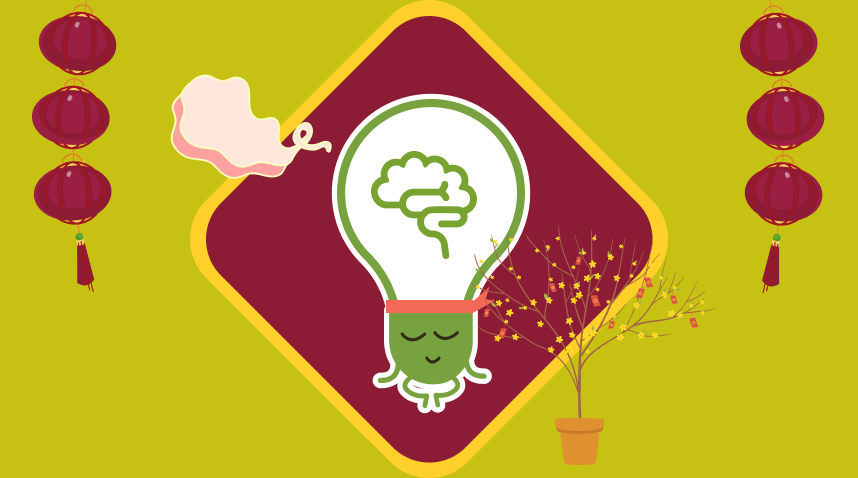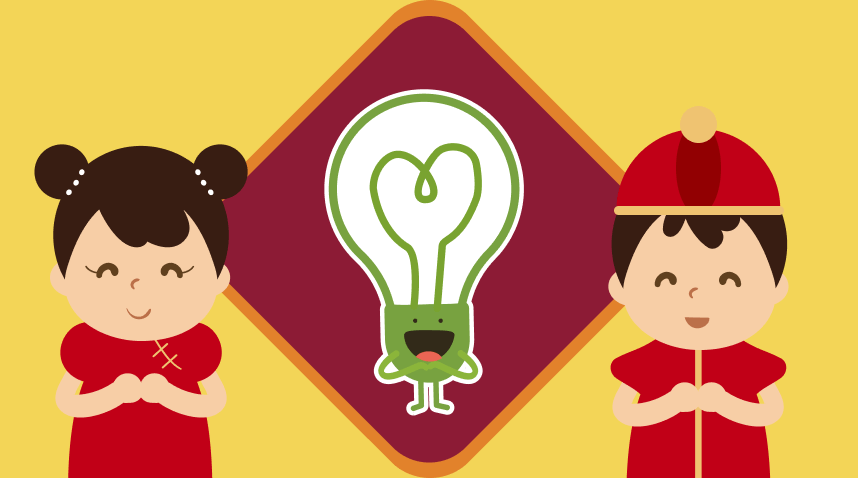For a banana like myself, my mind can sometimes take a vacation when I go house visits to relatives. Creating this article hopefully helps me and those struggling people out there go through CNY without stirring up more anger than is needed in samsara.
If you are an expat/ mountain turtle who nearly wore black to their colleague’s house for CNY, this article will help you impress your hosts too. I have weaved in some Dhamma verses to add further flavour to these greetings. Here we go!
1. 新年快乐 (Xīn Nián Kuài Lè)

This is the classic greeting which means “Happy New Year” and is ‘deployed’ at the host’s door with two oranges.
Interestingly, the Dhamma teachings focus on the day-to-day, a deeper level of greeting and practice. HH Dalai Lama contemplates:
“Every day, think as you wake up, today I am fortunate to be alive, I have a precious human life, and I am not going to waste it. I am going to use all my energies to develop myself, to expand my heart out to others; to achieve enlightenment for the benefit of all beings.”
We might feel that 2023 will be a year of great uncertainty given the slew of layoffs. But we use such greetings to remind us of the positive possibilities each day and year might bring.
2. 步步高升 (Bù Bù Gāo Shēng)

This greeting means “to ascend higher with each step”. It wishes the other person progress in whatever they do and set their mind towards.
The Buddha last words were ‘Strive on with diligence’ as he left his disciples. This meant going forward with the practice despite the adversities faced on the path. We sometimes ask ‘How do I know if I am progressing on the path as a Buddhist?’. Ajahn Brahm, a famous monk from Australia, talks about checking if we are gradually letting go of Greed, Hatred, and Delusion within us as a marker of progress.
To progress. We must let go.
3. 年年有余 (Nián Nián Yǒu Yú)

This greeting is a word play with the Chinese words “余” (yú) which sounds like identical to “鱼” (yú).
“”余” (yú) forms the phrase “剩余”, which translates to abundance. The second “鱼” (yú) means “fish” which is commonly an auspicious symbol in Chinese customs
So you are greeting the person with multiple abundance every year!
Buddha talked about blessings in the Mangala Sutta which we can associate with the idea of abundance (having enough).
“Not to associate with the unwise, but to associate with the wise, and to honour those who are worthy of honour — this is the greatest blessing.
To reside in a suitable locality, to have done meritorious actions in the past and to set oneself on the right course — this is the greatest blessing.”
There are 38 such blessings mentioned by the Buddha. Do check it out to literally count your blessings:) You might realise that your blessings and abundance are more ‘overflowing’ than you could ever imagine.
4. 心想事成 (Xīn Xiǎng Shì Chéng)

This greeting points towards ‘Achieving what the heart desires’.
“Mind is the chief forerunner of all good states.
Experiences are led by and produced by the mind. “
The Buddha pointed out mind as the first area of origin that defines our action and experiences. By changing the way we think and act, we can change our lives. Recognising the importance of the heart is key to changing our year ahead.
If what we desire is unskillful / ill-will in nature, we are likely to end with an outcome that is sub-optimal for our happiness. Likewise, this works for us if we are skillful and good-willed in nature.
5. 金玉满堂 (Jīn Yù Mǎn Táng)

This is the most Chinese greeting we can conjure up. It translates to ‘wishing you a house full of gold and jade”. This means we wish someone an abundance of wealth and wisdom/knowledge.
This is probably something most of us dream towards. Interestingly, the Buddha often talked about the 3 refuges (Buddha, Dhamma, Sangha) as the triple gem. Real gems that are beyond the cusps of ageing, sickness, and death.
“And what is the noble search? There is the case where a person, himself being subject to birth, seeing the drawbacks of birth, seeks the unborn, unexcelled rest from the yoke: Unbinding. Himself being subject to ageing… illness… death… sorrow… defilement, seeing the drawbacks of ageing… illness… death… sorrow… defilement, seeks the ageing-less, illness-less, deathless, sorrow-less, undefiled, unexcelled rest from the yoke: Unbinding. This is the noble search.” – Ariyapariyesana Sutta
A noble search for the Dhamma is one that gives an abundance of spiritual wealth and wisdom. Our material riches, loved ones, and titles will eventually fade upon death, so Buddha encourages us to work on something that doesn’t fade with effort-Our practice.
And there you go! 5 CNY verses that bring 5 different Dhamma reflections as we dive into the Chinese New Year. May these reflections bless both you and your family!


